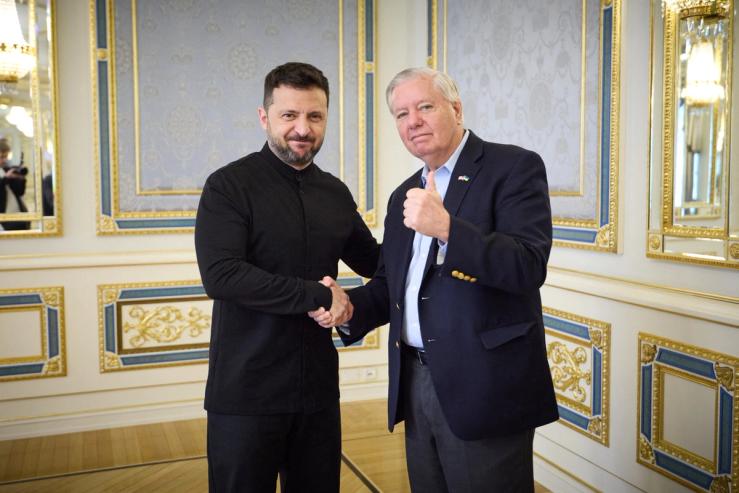The News
The Senate is pushing off plans to sanction Russia and its trading partners until at least July, as war between Iran and Israel and Republicans’ massive tax cuts bill blot out the popular bipartisan legislation.
Sens. Lindsey Graham, R-S.C., and Richard Blumenthal, D-Conn., are zeroing in on a revised version of their bill that would shield Ukraine’s allies from some sanctions for trading with Russia and make other technical changes. But their hopes of getting a bill through the Senate this month have withered as other priorities take precedence.
GOP leaders want President Donald Trump’s tax and spending megabill on the floor next week, Iran is pulling Trump to the brink of direct military engagement, and the president hasn’t given the Senate the green light to pass the sanctions. It doesn’t help that a cryptocurrency bill took more than a month to clear the chamber, underscoring the heavy lift needed in even popular proposals.
Senate Majority Leader John Thune, R-S.D., said on Tuesday that a “July timeframe” for Russia sanctions was most likely at this point: “We’re very open to moving, we’re trying to work with the administration from a timing standpoint.”
And Graham told Semafor the Senate is “going to have to wait a bit” on Russia sanctions, without giving a specific timetable.
“Things are changing now with Iran … that doesn’t mean I’ve forgotten about Russia or Ukraine. Not at all,” Graham said of the timing of the legislation. “Iran is center stage, but sooner rather than later.”
Republicans have been threatening to move on the sanctions bill for weeks, eager to hit back at Russian President Vladimir Putin’s regime. After military aid for Ukraine badly split the party, sanctions have become more unifying for Republicans — although plenty of them are not keen to move without Trump’s go-ahead.
That signal hasn’t arrived yet. And while Graham negotiates with the White House, the spiraling conflict between Iran and Israel is eclipsing the deteriorating security situation in Europe. Trump left a Group of Seven meeting in Canada early — skipping a planned meeting with Ukrainian President Volodymyr Zelenskyy.
“All the focus is on Israel and Iran right now,” Sen. Tommy Tuberville, R-Ala., told Semafor, adding that he is “all for putting sanctions on” Russia.
Trump convened a Situation Room meeting on Tuesday amid open posturing that he might strike Iran’s nuclear facilities, but by nightime he had not made a call.
Graham and Blumenthal vowed imminent floor action after visiting Ukraine recently and said they’d hoped to have their bill approved by this week’s G7 meetings. Thune and other top Republicans later said the Senate could take the bill up this month as efforts by the Trump administration to get peace negotiations between Kyiv and Moscow off the ground fell short.
Those scheduling hopes are now all but out of reach.
Earlier this week, Russia targeted Kyiv with deadly drone and missile strikes. In an interview, Blumenthal said he and Graham are “making tremendous progress” with the administration but “our real obstacle is everything else that’s going on, particularly reconciliation,” the vehicle for Trump’s tax cuts.
“Things here never move as fast as we would like, but there are no obstacles besides everything else that’s going on in the world. And Donald Trump personally should call on Congress to move,” Blumenthal added.
Know More
Proponents of the sanctions legislation argue it would give Trump more leverage to force Putin — who thus far has spurned peace talks — to the table.
“We want to strengthen our hand in the negotiation. So that timing is being done, from our perspective, with the administration,” said Sen. John Hoeven, R-N.D. “We want to help effectuate an outcome in Ukraine, so we’re trying to use it in a way that actually helps get something done”
The bipartisan Senate bill would give the administration the power to impose secondary sanctions on Russian trading partners, including countries that purchase Russian energy.
Graham told Semafor earlier this month that he was working on a carveout for nations who have supported Ukraine — a tweak that would ease worries in Europe about the impact of the penalties and likely make the bill easier to pass. Blumenthal said they are also adjusting the legislation around the contours of the world banking system.
“There is no evidence that Putin is going to slow down,” Graham told Semafor on Tuesday. “We need to change the approach. I think the sanctions will give the president leverage.”
Room for Disagreement
Democrats — even those who don’t always toe the party line — are plenty impatient. They’d like to see the Senate pass sanctions now and go even further with more weapons for Ukraine.
“I would vote for anything, more military aid, stronger sanctions. Everything,” said Sen. John Fetterman, D-Pa. “I’m very pro-Israel, very strong on Taiwan and Ukraine. That’s all in the same war for democracy, whether it’s Russia, Iran or China.”
The View From The White House
Trump has been losing patience with Putin, boosting hopes that he might get behind an effort to move the Senate bill to increase the pressure on the Russian leader.
Trump’s remarks about sanctions have been inconsistent, however, and on Monday he suggested that Europe should move first on any more penalties.
One former Trump administration national security official predicted the Middle East crisis would cause the White House to double down on a retreat from Europe.
“I think it reinforces the inclination to withdraw from [an] active mediator role in Ukraine,” the former official told Semafor.
Notable
- The White House has been working behind the scenes to water the sanctions -bill down, The Wall Street Journal reported earlier in June.
- The U.K. moved ahead with new sanctions on Russia on Tuesday, according to Reuters.

